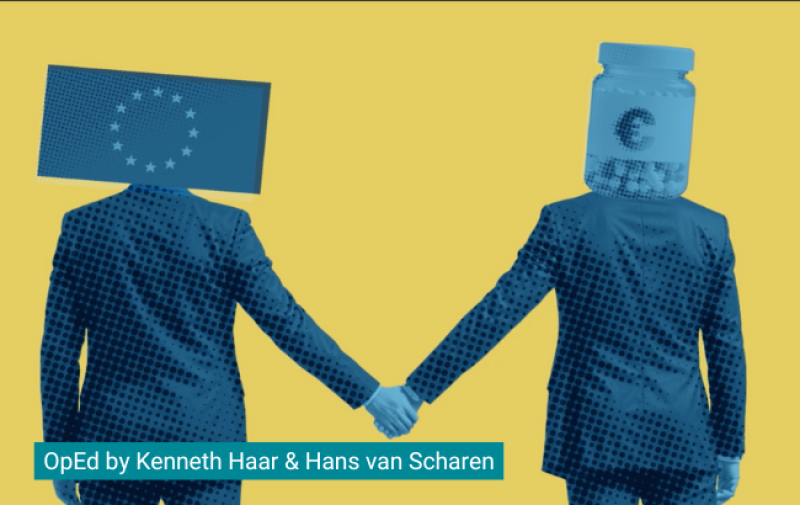Stay always informed
Interested in our articles? Get the latest information and analysis straight to your email. Sign up for our newsletter.

This article was written by Kenneth Haar (CEO) and Hans van Scharen (CEO), and originally appeared in euobserver.
Two weeks ago ‘Orbanesque emails’ suddenly started landing in the inboxes of dozens of Brussels-based green NGOs.
CINEA, the agency that deals with funding for all kinds of environmental projects financed by the LIFE programme on behalf of the European Commission, requested the NGOs to review the grant contracts for 2024 that were approved and signed early this year.
The rationale behind this? The new commission’s policy guidelines state that EU subsidies can no longer be used for civil society’s advocacy work.
This new policy is based on two-pages with guidelines from 7 May this year, prepared by the commission’s secretariat-general and directorate-general for budget.
And it’s clear these could have a huge impact, not just for so-called ‘green NGOs’, but for all in the civil space in EU policymaking.
According to the new guidelines “avoiding reputational risk” is a new benchmark for EU funding of NGOs. And according to the commission, that risk is particularly stark if a grant is used for “sending letters, organising meetings or providing advocacy material to EU institutions or specific members of an institution; or identifying specific members or officials of an institution to evaluate or describe their positions, or to discuss specific political content or outcome.”
Should an NGO cross the vaguely and broadly described line, which most likely has no legal basis, a grant can be denied or suspended.
This can or will clearly have chilling effects and limit the democratic action space for civil society, and it will tip the balance even further towards the corporate lobby groups that already dominate the lobbying scene.
This move is an outcome of years of political pressure from the top of the European People Party (EPP), the conservative group in the European Parliament, who have waged a campaign to have the commission use EU grants to silence criticism.
As Politico recently reported, during the EU election campaign, the EPP called for “greater accountability and transparency for NGOs, in particular those accessing EU funding.”
The hostility from certain EPP politicians goes back at least to 2016 when German MEP Markus Pieper from Ursula von der Leyen’s German CDU party took the lead in an attack on NGOs.
The ‘logic’ of the campaign was always that organisations that do not support their policies, and that go against some of the EU policies, should lose their funding.
Pieper tried twice to convince a majority in 2017 and in 2023 to use threats of an end to EU funding as a weapon against NGOs, but largely failed the first time and got his report approved last year.
When in 2016 a broad civil society movement rallied against the controversial and now defunct trade and investment agreement (TTIP) between the EU and US, Pieper tried to convince his colleagues in the Budget Committee to do a report into the finances of civil society.
He commissioned a report — later retracted by the EPP — with which Pieper denounced that the EU was funding NGOs who he bizarrely claimed were "opposing European values".
Pieper suggested that "NGOs that do not comply with the EU's strategic commercial and security policy objectives should not receive EU funding".
The current NGO-critical and aggressive questions being discussed in the European Parliaments Budget Committee earlier this week, are, for example, about civil society protests against the Mercosur trade agreement or about NGOs litigating against coal-fired power plants.
It does not take much knowledge about political reality in the Brussels bubble to imagine the dire consequences: corporate lobby groups will dominate the lobbying scene even more than is the case today.
A grotesque imbalance will be exacerbated even further. for example when the commission invites yet another group of oil and gas companies to help with its energy strategy, the corporate lobbyists from the energy sector are praised for their efforts.
With on the other hand, the commission takes more steps to silence green NGOs.
The EPPs attack on NGOs has taken many grotesque turns.
As with the Qatargate scandal that saw in December 2022 MEPs allegedly working with the Qatari and Moroccan regimes while receiving large sums of money. While the EPP were reluctant to introduce effective ethics and transparency rules, they were eager to exploit the occasion to launch yet another attack on NGOs. The EPP announced “we need to talk about NGOs”.
The sometimes successful campaigns by often under-financed and understaffed NGOs is a source of utter frustration: civil society simply counters their pro-corporate sector narrative and neo-liberal ideology.
With the announced massive deregulation agenda of Ursula von der Leyen's second commission, they do not want to let this happen again, and seek to stifle any critical reflection by NGOs. The new guidelines that have followed their campaign is nothing but a 'gag order’.
In recent years this EPP-led campaign has been fired up by relentless questions and false information from far-right politicians, especially in the run up to the EU elections.
Now the EPP seems to be in bed with ECR and the Patriots groups. And currently the pressure is being used in the context of the annual discharge procedure in the committee of budget control (CONT) that has to grant discharge of the European Commission Budget, where a first debate took place on Monday (9 December).
And the ECR group asked for a plenary debate next week.
The consequences of their anti-civil society narrative and campaign can have severe consequences.. Corporate interests already significantly outnumber and outspend public interest groups in EU lobbying: without EU funding for NGOs this problem would become even far worse, negatively impacting the quality of EU decision-making and therefore public trust.
Corporate Europe Observatory (CEO) does not take EU funding.